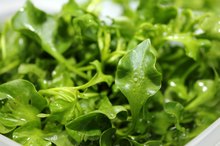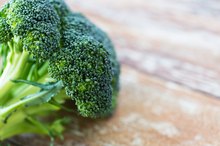How to Fry Shrimp in Olive Oil & Butter
Frying shrimp in olive oil and butter will reduce the amount of butter needed in the frying process without compromising rich flavor, while adding the healthier unsaturated fats olive oil boasts. Because shrimp cooks quickly, the essential fatty acids in olive oil will stay intact as long as attention is paid to prevent overheating. People who need to reduce their saturated fat intake may wish to reduce butter to a minimum without sacrificing olfactory pleasure.
Frying Shrimp in Olive Oil and Butter
Toss peeled and de-veined shrimp with sea salt, crushed garlic cloves, white pepper and red chili paste until well coated. Allow to sit for 20 minutes in the refrigerator 1.
How to Cook Watercress
Learn More
Melt 1 tbsp to 1/4 cup butter in large saucepan, depending on your preference. More butter will increase the saturated fat content. Allow the butter to brown slightly, but do not burn.
Toss prepared shrimp into melted butter and stir vigorously until shrimp begins to show signs of getting pink.
How to Blanch Broccoli
Learn More
Add enough olive oil to coat shrimp lightly and continue frying until shrimp is completely pink, about 2 minutes.
Remove shrimp from heat and serve while still hot, or reserve in the refrigerator for no longer than 2 days for a tasty protein addition to salads, pastas and snacks.
Tips
Cooking the shrimp quickly at a higher temperature will promote tenderness without risking undercooking. Shrimp has a short freshness life and should not be consumed if doubts about freshness are present.
Warnings
Many people are severely allergic to all kinds of shellfish, including shrimp. Be sure to inform anyone you are serving to prevent an accidental allergic reaction. If you suffer gastrointestinal problems after consuming shrimp, please contact your doctor in case of food poisoning.
- Toss peeled and de-veined shrimp with sea salt, crushed garlic cloves, white pepper and red chili paste until well coated.
- Add enough olive oil to coat shrimp lightly and continue frying until shrimp is completely pink, about 2 minutes.
Related Articles
References
- "The Nutrition Almanac"; Luvanne Dunne; 2001
- "Dr. Atkins New Diet Revolution"; Atkins Health & Medical Information Serv; 2005
- "Simply Thai Cooking"; Wandee Young; 1996
- Soliman GA. Dietary cholesterol and the lack of evidence in cardiovascular disease. Nutrients. 2018;10(6). doi:10.3390/nu10060780
- Shrimp, steamed or boiled. FoodData Central. U.S. Department of Agriculture. Published April 1, 2020.
- Can you get jumbo benefits from eating shrimp?. Tufts University Gerald J. and Dorothy R. Friedman School of Nutrition Science and Policy. Updated 2013.
- Choline. Oregon State University. Linus Pauling Institute. Updated in 2015.
- Tischmann L, Drummen M, Gatta-Cherifi B, et al. Effects of a high-protein/moderate-carbohydrate diet on appetite, gut peptides, and endocannabinoids-A preview study. Nutrients. 2019;11(10). doi:10.3390/nu11102269
- Barros MP, Poppe SC, Bondan EF. Neuroprotective properties of the marine carotenoid astaxanthin and omega-3 fatty acids, and perspectives for the natural combination of both in krill oil. Nutrients. 2014;6(3):1293-317. doi:10.3390/nu6031293
- Bonjour JP. Protein intake and bone health. Int J Vitam Nutr Res. 2011;81(2-3):134-42. doi:10.1024/0300-9831/a000063
- Shellfish allergy. American College of Allergy, Asthma & Immunology. Updated 2019.
- Shrimp. Seafood Health Facts: Making Smart Choices Balancing the Benefits and Risks of Seafood Consumption. Updated 2020.
- Selecting and serving fresh and frozen seafood safely. U.S. Food and Drug Administration. 2019.
- Food safety risks for pregnant women. Academy of Nutrition and Dietetics. Updated 2018.
Tips
- Cooking the shrimp quickly at a higher temperature will promote tenderness without risking undercooking. Shrimp has a short freshness life and should not be consumed if doubts about freshness are present.
Warnings
- Many people are severely allergic to all kinds of shellfish, including shrimp. Be sure to inform anyone you are serving to prevent an accidental allergic reaction. If you suffer gastrointestinal problems after consuming shrimp, please contact your doctor in case of food poisoning.
Writer Bio
Sara Clement has been a writer, editor and social-media expert since 2002. A regular contributor for publications such as "Exhale," "Reflections of a Butterfly" and "The Giggle Guide," she is currently writing a book about grief and loss and coauthoring a sequel to "Being Ourself." She holds a Bachelor of Arts in premedical science and psychology/education from the University of Montana.








